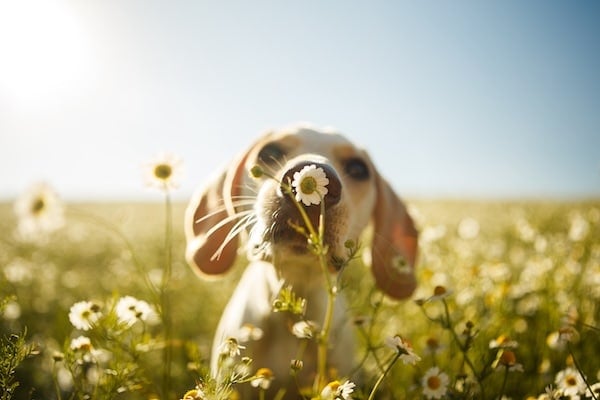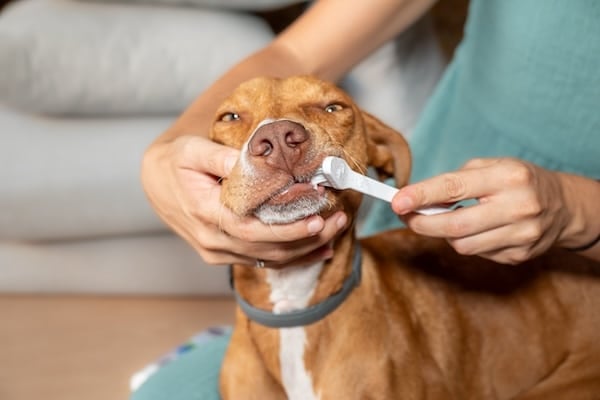- Not a substitute for professional veterinary help.
Have you ever noticed your puppy’s breath has a distinctive smell? It might remind you of a sweet vanilla perfume or milk with honey. The phenomenon is so famous that it’s just referred to as “puppy breath.” And believe it or not, monitoring its smell can give you some key clues about your growing dog’s health.
The puppy breath phase doesn’t last long. Around the 4 to 6 month mark, your puppy’s breath can start to change and can even smell a bit off as the teething process kicks off.
So what’s considered normal, and when should pet parents worry about bad puppy breath? To learn more, we reached out to Dr. Nell Ostermeier, DVM, CVA, FAAVA, a veterinarian and spokesperson with Figo Pet Insurance.
Why Does Puppy Breath Smell Sweet?
A combination of factors help make a puppy’s breath smell sweet during the first few months of their life.
“There is a short period of time where your very young puppy is drinking their mother’s milk and has no teeth for bacteria to reside and form plaque,” Dr. Ostermeier explains. “They also aren’t consuming any smelly foods, nor exploring their environment and finding interesting (sometimes smelly) things to chew or eat.”
But what makes that smell pleasant? Here’s the breakdown:
- Diet. Milk naturally has a slightly sweet scent, thanks to the natural sugars contained in it. Since puppies only drink their mother’s milk as newborns, this scent can transfer to a puppy’s breath, giving it a similarly pleasant and milky smell.
- Fresh mouths. Thanks to their milk-only diet, young puppies have much less plaque than older dogs. Without leftover food particles stuck in their teeth or bacteria from chewing on objects, puppies have much more neutral-smelling breath during the first few months of their lives.
- Teething. Although teething can be associated with an unpleasant smell, the extra saliva produced during teething can sometimes contribute to cleaner breath. More saliva helps wash away food particles and prevents bacteria from building up, keeping a puppy’s breath fresher.
- Gas. The gas from drinking a milk-only diet can sometimes make its way to a puppy’s mouth. Instead of smelling unpleasant, the way that an older dog’s gas might, the associated burps from a milk-only diet give the puppy’s breath more a milky aroma.

Capuski via iStock
How long does puppy breath last?
As a dog grows older and changes, so does their breath. The sweet “puppy breath” scent usually fades around 3 to 4 months. As a puppy’s adult teeth begin to come in, bacteria accumulates around the gums for the first time, which will eventually lead to plaque.
“Once this starts to develop, and depending on what their eating, there will start to be an odor,” says Dr. Ostermeier. You can expect especially bad odors if your puppy’s teeth aren’t routinely brushed.
Once a puppy becomes an adult, their breath may change again, developing a more distinctive odor. Factors like diet and dental hygiene play a big role at this point, as does a dog’s overall health. Conditions like kidney disease or digestive problems can lead to further changes in the smell of a dog’s breath—which is why it’s important to monitor.
What Makes a Puppy’s Breath Smell Bad?
If your puppy’s normally sweet breath suddenly has you backing away, don’t panic. There are lots of normal reasons for a temporary bad smell, like a puppy who stole a stinky snack, shed a little blood when losing a tooth, or has a bit of food stuck in their teeth.
If an atypically bad smell doesn’t resolve quickly, Dr. Ostermeier recommends giving your vet a call to make sure an oral infection or underlying illness isn’t to blame.
- Eating poop. Puppies may eat poop for a variety of reasons, and if you don’t clean their mouth right away, it can leave a lingering and unpleasant scent.
- Teething. When new teeth erupt in a puppy’s mouth, the gums can become inflamed and bleed, producing a metallic smell.
- Stinky chews. Chewing on toys can sometimes introduce bacteria into the mouth that can exacerbate odors.
- Infection or disease. Symptoms like decreased appetite, lethargy, oral discharge, and oral bleeding can indicate an infection that’s making your puppy’s breath smell foul. “If you notice these symptoms, make sure to seek veterinary care immediately,” cautions Dr. Ostermeier.

Ignacio Villafruela via iStock
How To Manage Puppy Breath
Monitoring your puppy’s breath is important for their overall health and well-being. Bad breath in dogs is often a sign of periodontal disease, which can lead to painful chewing and, if untreated, tooth loss. Dental bacteria can also spread to other parts of your pet’s body, including the heart, liver, and kidneys, causing serious health issues.
Simple steps, like incorporating teeth-brushing and chew toys into their daily routine, can keep their breath fresh, support strong teeth and healthy gums, and prevent other health issues in the future.
Tooth brushing
The best strategy to keep a puppy’s breath as fresh and clean as possible is to establish a teeth-brushing routine. It’s a great idea to start brushing a puppy’s teeth as early as 8-12 weeks old to get them accustomed to the feeling.
Using a dog-sized toothbrush and dog-friendly toothpaste, start slow. At first, try just lifting up their lips after a few gentle pets and scratches at the muzzle. If that goes well, you can try running a finger across their teeth. Once your puppy is used to that, squeeze a tiny amount of toothpaste on their teeth and let them lick it. Finally, you can begin to brush their teeth, aiming for about 20-30 seconds on each side.
Although daily brushing is ideal, even a few times a week can be beneficial. The most important thing is to ensure that it’s a positive experience for your pup.
How do chew toys and dental chews factor into this?
Although chew toys and dental chews shouldn’t be used as a substitute for teeth brushing, incorporating them into your dog’s daily routine can support oral health and improve their breath. Many dental chews are designed with an abrasive surface to help scrape away any plaque or food stuck in their teeth as a puppy gnaws on them, naturally freshening their breath in the process.
Dental chews may also contain breath-boosting ingredients like mint or parsley that can help neutralize odor-causing bacteria in a puppy’s mouth.
How to prevent your puppy from eating poop
The best way to prevent a puppy from eating poop—whether their own or another dog’s—is to avoid exposing them to any. This may mean cleaning up immediately after potty breaks or avoiding parks or places where poop has been left. Teaching cues like “leave it” can help them avoid eating poop, too.
Some poop-eaters do so out of hunger or nutritional deficiencies, so it’s a good idea to consult with a vet and consider switching up your puppy’s diet if you suspect this might be the case.




